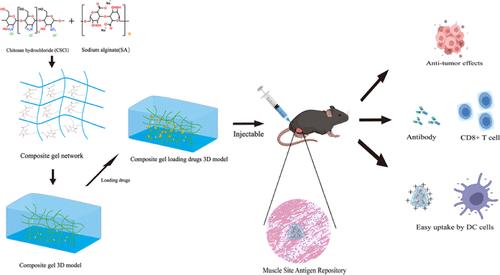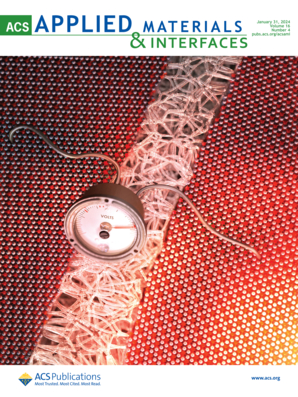一种可注射的盐酸壳聚糖-海藻酸钠水凝胶佐剂,能激发强效体液免疫和细胞免疫
IF 8.2
2区 材料科学
Q1 MATERIALS SCIENCE, MULTIDISCIPLINARY
引用次数: 0
摘要
佐剂可以增强疫苗的免疫效果。目前,最常用和验证的是铝和油乳液佐剂。然而,这些佐剂并非没有缺陷;例如,铝佐剂可在注射部位引起不良反应和刺激。因此,开发新的、安全的、有效的佐剂仍然是疫苗研究中的一个突出课题。本研究以海藻酸钠(SA)和壳聚糖衍生物盐酸壳聚糖(CHCL)为原料合成复合水凝胶,探讨该聚合物复合水凝胶作为新型免疫佐剂的可行性。我们的研究结果表明,这种水凝胶材料具有良好的生物相容性和抗菌性能,易于注射,并且通过刺激树突状细胞(dc)吞噬蛋白抗原来局部启动疫苗反应。此外,它们提供持续接触疫苗抗原的机会。在给药后,一个短暂的炎症生态位被创造出来,以延长免疫系统的激活。重要的是,我们的研究表明,装载抗原的CHCL-SA水凝胶有效地刺激身体产生体液免疫反应,并促进CD8+ T淋巴细胞亚群的成熟。在小鼠肿瘤激发实验中,CHCL-SA补充抗原组显著抑制肿瘤细胞生长,提高小鼠存活率。总之,我们开发了一种可注射的CHCL-SA水凝胶佐剂,具有提高疫苗效力的巨大潜力。本文章由计算机程序翻译,如有差异,请以英文原文为准。

An Injectable Chitosan Hydrochloride-Sodium Alginate Hydrogel Adjuvant Capable of Eliciting Potent Humoral and Cellular Immunity
Adjuvants can enhance the immune effects of vaccines. Currently, the most commonly used and validated are aluminum and oil-emulsion adjuvants. However, these adjuvants are not without flaws; for instance, aluminum adjuvants can cause adverse reactions and irritation at the injection site. Consequently, the development of new, safe, and effective adjuvants remains a prominent topic in vaccine research. In this study, we synthesized a composite hydrogel by combining sodium alginate (SA) and the chitosan derivative chitosan hydrochloride (CHCL) to explore the feasibility of this polymer composite hydrogel as a novel immunoadjuvant. Our results indicate that this hydrogel material possesses good biocompatibility and antibacterial properties, is easily injectable, and locally initiates vaccine responses by stimulating the phagocytosis of protein antigens by dendritic cells (DCs). Additionally, they offer sustained exposure to vaccine antigens. After administration, a transient inflammatory niche is created to prolong immune system activation. Importantly, our study demonstrated that the CHCL-SA hydrogel loaded with antigens effectively stimulated the body to produce a humoral immune response and enhance the maturation of the CD8+ T lymphocyte subset. In murine tumor challenge experiments, the CHCL-SA supplemented antigen group significantly inhibited tumor cell growth and improved mouse survival rates. In summary, we developed an injectable CHCL-SA hydrogel adjuvant with great potential for enhancing the efficacy of vaccines.
求助全文
通过发布文献求助,成功后即可免费获取论文全文。
去求助
来源期刊

ACS Applied Materials & Interfaces
工程技术-材料科学:综合
CiteScore
16.00
自引率
6.30%
发文量
4978
审稿时长
1.8 months
期刊介绍:
ACS Applied Materials & Interfaces is a leading interdisciplinary journal that brings together chemists, engineers, physicists, and biologists to explore the development and utilization of newly-discovered materials and interfacial processes for specific applications. Our journal has experienced remarkable growth since its establishment in 2009, both in terms of the number of articles published and the impact of the research showcased. We are proud to foster a truly global community, with the majority of published articles originating from outside the United States, reflecting the rapid growth of applied research worldwide.
 求助内容:
求助内容: 应助结果提醒方式:
应助结果提醒方式:


